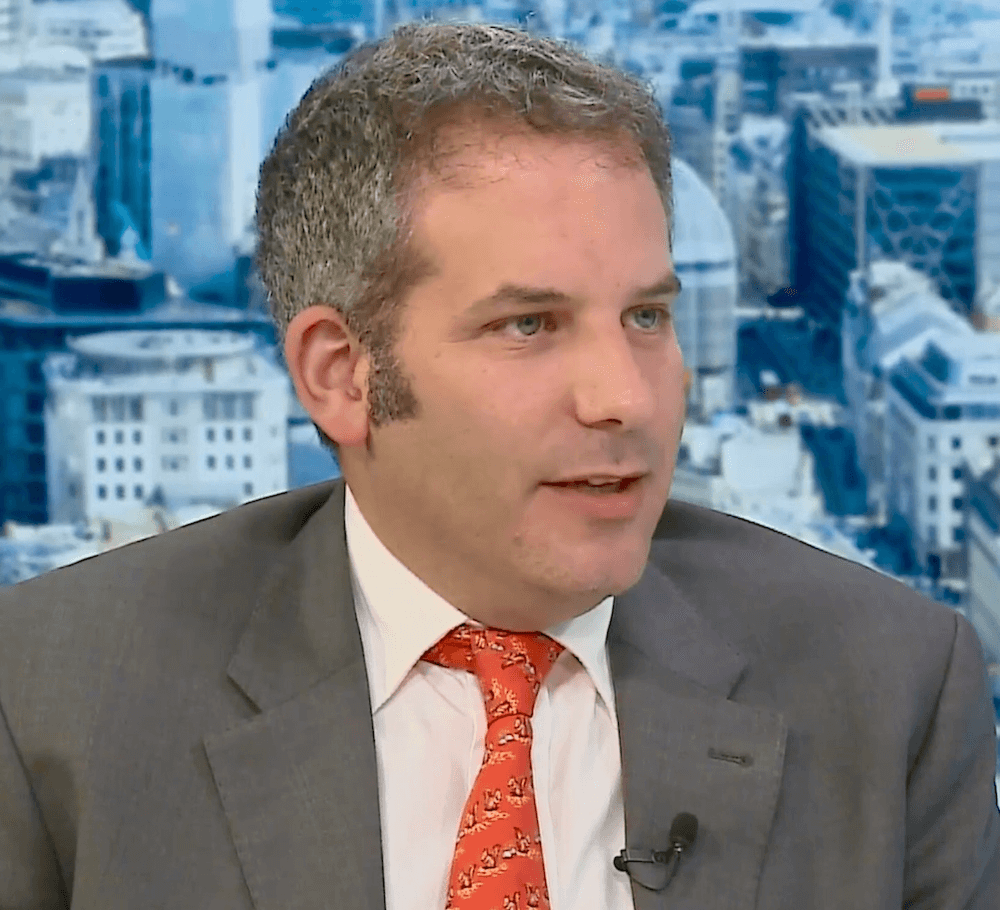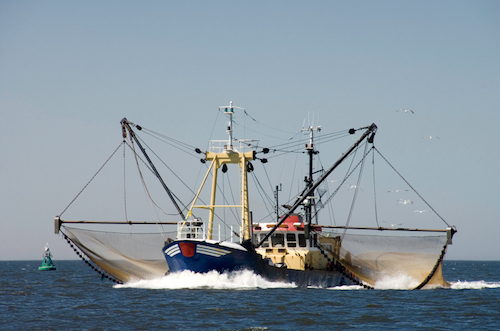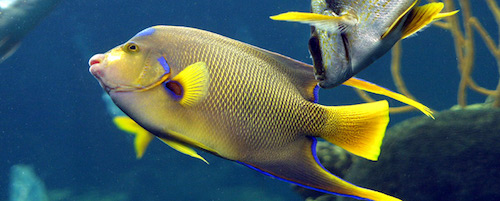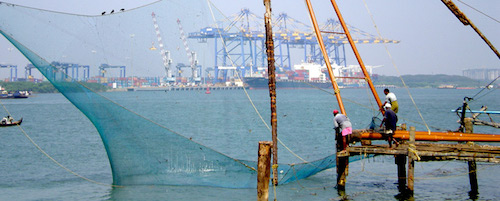Elephants and the ocean: building a brighter, smarter future for our seas

The Black Elephant is an occurrence that is perfectly foreseeable but whose causes are ignored – until it happens. Ocean health is a Black Elephant.
I recently came across the concept of «The Black Elephant» – a cross between two metaphors: the «Elephant in the Room» (an issue that everyone knows is important but no one wants to mention) and «the Black Swan» (a wholly unexpeted event with enormous ramifications). The Black Elephant, then, is an occurrence that is perfectly foreseeable but whose causes are ignored – until it happens. Then it is passed off as a Black Swan.
Ocean health is a Black Elephant. The combined effects of overfishing, habitat loss, ocean acidification and pollution are a clear and present danger to life on Earth. The scientific data are unequivocal. The degradation of marine ecosystems at ever-increasing velocity is one of our biggest challenges. Fortunately, it is also one of the easiest to solve.
We must see the oceans afresh

The first step is to reconceptualize how we think about the ocean. It needs to be understood – above all else – as a living organism. All marine species play a role in its functioning. Their loss and degradation affects the sea’s ability to provide the basic building blocks of life oxygen, freshwater, nutrient cycling and climateregulation. Without them, we would have no food or freshwater and would already be experiencing runaway climate change.
At present, we think of the ocean mainly as an economic resource, treating it as a garbage dump, a looting ground, and a bottomless mine. But that way of «seeing» could not possibly be more shortsighted.
Economic and financial systems, unlike natural ecosystems, are illusory and ephemeral human constructs. They are constantly changing through market failure, human self-interest, as well as geopolitical and technological shifts. The current, dominant, form of free market capitalism is eroding the natural base essential to supporting the needs and rights of the seven billion people currently on the planet.
Even from the viewpoint of the free market capitalist, the accelerating plunder and poisoning of the seas makes no economic sense: the risk/reward ratio is wildly unfavorable. Most nation-states are so financially overleveraged that they are considering austerity measures that will have negative social and political ramifications. In that context, how does it make sense to pay out fishing subsidies that support increasingly destructive practices?
The reconceptualization that I’m proposing would have at its core an understanding that it is our duty to protect, preserve, and use marine resources with thoughtful responsibility for the survival, as well as the long-term benefit, of the entire planet and particularly for its least advantaged inhabitants.
Even from the viewpoint of the free market capitalist, the accelerating plunder and poisoning of the seas makes no economic sense.
We urgently need to declare a ceasefire on marine ecocide

In a more evolved world, destructive fishing and extractive practices would be banned. In the world we actually inhabit, attempts to regulate them are blocked at every turn.
Still, a number of risk-mitigation measures are available:
- 1. It is in every nation’s interest to establish user fees in their waters that charge (based on the true cost of resource extraction) for the deployment of technologies that are more akin to war than to anything that resembles fishing. The cost-prohibitive fees for destructive gear, bycatch and over fishing would make such practices less lucrative; money raised from less invasive fishing could be used to protect ecosystems.
- 2. Likewise, companies seeking to clear-cut fragile and rare seabed ecosystems for a few months’ worth of minerals could be charged licens fees based on the true cost of resource extraction, required to post bonds to restore damage, and fined for any destruction they cause. This would act as a disincentive to harmful large-scale seabed mining practices and put the focus instead on reuse and recycling of rare earths and other mineral resources.
- 3. There are many financial and social advantages for the world’s poorest coastal communities from other kinds of ecosystem protection. A case in point is the Indian Ocean where Locally Managed Marine Areas have been established, enabling artisanal fishermen to quadruple their catch and double their income.
- 4. In the current global economic climate where foreign aid is coming under scrutiny, simply not extracting from the oceans – and supporting measures to protect them – would be a genuinely cost-effective way to help alleviate poverty and strengthen the planet’s core infrastructure. It could do more to generate equity for poorer nations than any other singleintervention.
- 5. In relation to the high seas and seabed Area (areas not under national jurisdiction), the establishment of a new international agreement based on the public trust doctrine could create a new regime centered on responsibility and stewardship. It would enable the creation of a vast network of ocean areas protected from fishing or mining and improve the management of all human activities. The protection and enforcement of this trust could absorb some of the job losses that stem from the structural changes necessitated by proper ocean management. Harmful subsidies could be redirected to provide global benefits while supporting those individuals affected. It would not be hard to use financial engineering to create bonds to raise the capital to patrol and enforce the trust. Ships and other ocean users could be made to pay a toll which, in turn, could create a returnstream that could support ocean credit instruments.
- 6. Current political, economic, and social systems theoretically CAN deal with the collective challenges we face. The priority is to re-legitimize organizations like the United Nations and make some bold, concrete actions of real scale that prove to the disenfranchised and disempowered that the current economic system is not only for the benefit of the very few and very powerful. Politicians can truly be leaders and stewards and dispel the current perception that their role is only to facilitate a system addicted to short-term economic gain.

Once we shift our thinking we will find that many solutions to marine degradation have already been designed by leading scientists and ocean advocates. Healing the oceans is the best opportunity we have to reverse the degradation of the planet. With a shift in consciousness and coordinated global cooperation, we can peacefully lead this Black Elephant out of the room.
Adam Swaidan on Synchronicity Earth
It is easy to criticise existing structures and practices, warning of dire consequences if corrective action isn’t taken promptly, as I have just done. It’s quite another thing to actually do something. It is useful to remember that while Cassandra was given the power of prophecy, she was also fated to be ignored. In other words, talk is cheap.
What then is to be done?
- Synchronicity Earth will remove or lower barriers to environmental giving and help funders target their philanthropy effectively. We will find the right people and organisations to fund so that donors can rest assured that their money is being used wisely, and that their contribution is making a difference.
- We will bring environmental knowledge to the philanthropic community and increase awareness of the value of different types of intervention and actor – especially in the face of bad news headlines.
- We will work with conservation organisations to help them to achieve more than they could alone – by improving their capacity and strengthening their networks so that they can be greater than the sum of their parts.
- We will help bring forth the spirit of a better, more balanced world.
As chairman, I want to express my excitement and optimism about what we have set out to do and have done already. We are deeply grateful to those who have supported us financially, and to all the NGOs, advisors, and experts who have given so freely of their time and shared the benefit of their experience and wisdom.
We must continue to work together relentlessly in coordinated and generous fashion. We invite and welcome the maximum amount of interaction possible.
Adam Sweidan, Chairman, Synchronicity Earth